| Srl | Item |
| 1 |
ID:
168788


|
|
|
|
|
| Summary/Abstract |
This paper shows how a series of institutional reforms since 1994 have transformed the Japanese prime minister’s relationship with other actors in the Japanese parliamentary system and expanded his power. It further discloses that his power has grown even more since the formation of the second Abe administration in 2012.
|
|
|
|
|
|
|
|
|
|
|
|
|
|
|
|
| 2 |
ID:
117121
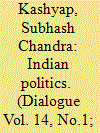

|
|
|
| 3 |
ID:
152453
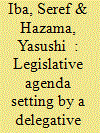

|
|
|
|
|
| Summary/Abstract |
This article examines the political motives and legislative consequences of Turkish omnibus bills that propose to amend a large number of disparate, unrelated laws. The quantitative analysis reveals, first, that the government uses omnibus bills to covertly change existing laws by attaching new articles to bills that are being deliberated. Second, undercover legislation backfires. The larger the number of current laws changed by an omnibus bill, the more likely those changes are to be annulled by the Constitutional Court. The legislative-efficiency objective behind omnibus bills is thus undermined by legal errors and deficiencies that result from a lack of parliamentary discussion.
|
|
|
|
|
|
|
|
|
|
|
|
|
|
|
|
| 4 |
ID:
093219
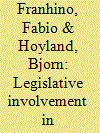

|
|
|
|
|
| Publication |
2009.
|
| Summary/Abstract |
In parliamentary systems, the need to preserve the political agreement that sustains the executive often motivates legislative involvement in policymaking. Institutional arrangements regulating executive-legislative relations and ministerial autonomy also structure parliamentary participation. However, empirical evidence of these effects remains limited to a few policies and countries. European Union legislation provides the opportunity to test expectations about legislative involvement for different types of measure across various institutional arrangements, across multiple policy areas, and across time. In this article, we investigate legislative involvement in the transposition of 724 directives in 15 member states from 1978 to 2004. Our results confirm that involvement increases as conflict between the responsible minister and her coalition partners intensifies. The discretionary scope embedded in the directive further inflates this effect. Additionally, parliamentary involvement decreases as the government's institutional advantage over the legislature increases, especially if intracoalitional conflict deepens.
|
|
|
|
|
|
|
|
|
|
|
|
|
|
|
|
| 5 |
ID:
129996
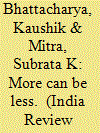

|
|
|
|
|
| Publication |
2014.
|
| Summary/Abstract |
A large number of candidates has become a regular feature of Indian elections. Given the regulatory concerns the problem has evoked, this article reviews the process of candidate entry in select developed countries. The review reveals the presence of diverse approaches, ruling out the necessity for extreme options like debarring fringe candidates-a course suggested by several Indian expert groups. Among various policy options, India had largely relied on electoral deposit. Our results suggest that an increase in deposits had a significant negative impact on candidate entry in India. However, for an effective deterrence, India needs to continue to keep deposits at a very high level compared to the current international benchmark, discriminating political participation of genuinely underprivileged groups. In contrast, the current level of signature requirements, a relatively unused policy tool in India, was found to be too low and could be easily increased further in order to be effective. We argue that given the high variation and lack of stability in candidate structure across regions and over time, a local approach on signature requirements-as in the U.S. -could be an effective deterrent in India. Accordingly, we suggest that the Election Commission of India should not only have the power to determine the deposit before each election; it should also have the power to change the minimum signature requirement across constituencies (subject to some standard checks and balances).
|
|
|
|
|
|
|
|
|
|
|
|
|
|
|
|
| 6 |
ID:
117123
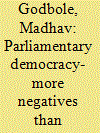

|
|
|
| 7 |
ID:
175071
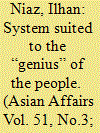

|
|
|
|
|
| Summary/Abstract |
In recent months there has been an effort to reignite debate about the suitability of a federal parliamentary system and argue that it needs to be replaced by a centralized presidential form of government. This has led to sharp reactions from those who favour a continuation of parliamentary government in Pakistan especially with regard to the strong federal provisions of the Eighteenth Amendment (2010) to the Pakistani Constitution, which granted greater autonomy to the provinces and undid many of the changes imposed by military rulers. This paper examines the original version of this debate from Pakistan's experience in the 1950s and 1960s with the aim of identifying and discussing the rationales of those in favor of a presidential Pakistan and the price that the country paid for undermining parliamentary government.
|
|
|
|
|
|
|
|
|
|
|
|
|
|
|
|
| 8 |
ID:
103233
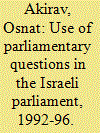

|
|
|
|
|
| Publication |
2011.
|
| Summary/Abstract |
This article examines the use of parliamentary questions in the Israeli parliament (Knesset) as a means of controlling the government during the years 1992-96 through an analysis of 1041 parliamentary questions on the basis of four criteria: efficiency (how long it takes to be answered); effectiveness (achieving its goals); the need for a supplementary question; and the publicity surrounding the minister's answer. It shows that although in the 13th Knesset the parliamentary question became a more efficient and effective parliamentary tool than in previous Knesset terms, its ability to serve as a means for controlling the government leaves much to be desired.
|
|
|
|
|
|
|
|
|
|
|
|
|
|
|
|
| 9 |
ID:
131811
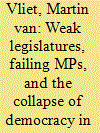

|
|
|
|
|
| Publication |
2014.
|
| Summary/Abstract |
The sudden collapse of Mali's democracy in 2012 revealed the fragility of the state's legitimacy and authority. This article argues that the decay of democracy was linked to the weakness of the country's legislature. Malian MPs collectively failed to scrutinize an increasingly discredited executive and parliamentarians typically operated in isolation from the vast majority of citizens. As a result, rising levels of popular discontent were rarely channelled into the formal political process, and the interests that did enter the political arena were largely restricted to the personal support networks and electoral constituencies of individual MPs. The prevalence of these particularistic interests undermined collective parliamentary scrutiny of matters of national interest. By demonstrating the link between these failures and the collapse of Mali's democracy, this article contributes to the expanding body of literature examining the limited role of African parliaments in processes of democratic consolidation. In doing so it confirms the challenges that executive dominance poses to democratization, while highlighting the importance of representative legislatures to Africa's democracies.
|
|
|
|
|
|
|
|
|
|
|
|
|
|
|
|